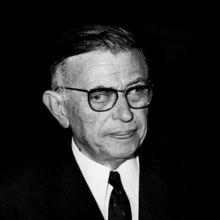Jean-Paul Sartre: Difference between revisions
(Created page with "{{Header|Jean-Paul Sartre 07/23}}{{DEFAULTSORT:Sarte, Jean-Paul}} {{Infobox person | birth_name = Jean-Paul Charles Aymard Sartre | region = Western philosophy | era = 20th-century philosophy | image = Sartre_1967_crop.jpg | caption = Sartre in 1967 | name = Jean-Paul Sartre | birthdate = {{dob|df=yes|1905|6|21}} | birthplace = Paris, France | deathdate = {{dod|df=yes|1980|4|15|1905|6|21}} | deathplace = Paris, France | school_tra...") |
m (Text replacement - "playwright" to "playwright") |
||
| (3 intermediate revisions by the same user not shown) | |||
| Line 1: | Line 1: | ||
{{Header|Jean-Paul Sartre 07/23}}{{DEFAULTSORT:Sarte, Jean-Paul}} | {{Header|Jean-Paul Sartre 07/23}}{{DEFAULTSORT:Sarte, Jean-Paul}} | ||
{{stack| | |||
{{Infobox person | {{Infobox person | ||
| | | color = lightblue | ||
| birthname = Jean-Paul Charles Aymard Sartre | |||
| image = Sartre_1967_crop.jpg | | image = Sartre_1967_crop.jpg | ||
| caption = Sartre in 1967 | | caption = Sartre in 1967 | ||
| Line 11: | Line 11: | ||
| deathdate = {{dod|df=yes|1980|4|15|1905|6|21}} | | deathdate = {{dod|df=yes|1980|4|15|1905|6|21}} | ||
| deathplace = Paris, France | | deathplace = Paris, France | ||
| school_tradition = [[Continental philosophy]], [[existentialism]], [[Phenomenology (philosophy)|phenomenology]], [[existential phenomenology]], | | school_tradition = [[Continental philosophy]], [[existentialism]], [[Phenomenology (philosophy)|phenomenology]], [[existential phenomenology]], [[hermeneutics]],[[Western Marxism]], [[anarchism]] | ||
| partner = Simone de Beauvoir (1929-1980) | | partner = Simone de Beauvoir (1929-1980) | ||
|awards=Nobel Prize for Literature (1964)<br> declined) | |awards=Nobel Prize for Literature (1964)<br> declined) | ||
}} | }} | ||
{{infobox educ-add | |||
| state = collapsed | |||
| color = lightblue | |||
| educ = École Normale Supérieure | |||
University of Paris (BA, MA) | |||
| era = 20th-century philosophy | |||
| region = Western philosophy | |||
| school = | |||
| works = | |||
| ideas = | |||
| main = Metaphysics, epistemology, ethics, consciousness, self-consciousness, literature, political philosophy, ontology | |||
| influencers = [[Wilhelm Stekel]] | |||
| influenced = line9 | |||
}} }} | |||
'''Jean-Paul Charles Aymard Sartre''' (/ˈsɑːrtrə/, US also /ˈsɑːrt/; French: [saʁtʁ]; {{star}}21 June 1905 – {{dag}}15 April 1980) was a French philosopher, [[playwright]], novelist, screenwriter, political activist, biographer, and literary critic, considered a leading figure in 20th-century French philosophy and Marxism. Sartre was one of the key figures in the philosophy of existentialism (and phenomenology). His work has influenced sociology, critical theory, post-colonial theory, and literary studies and continues to do so. Despite attempting to refuse it, he was awarded the 1964 Nobel Prize in Literature, saying that he always declined official honors and that "a writer should not allow himself to be turned into an institution." | |||
Sartre openly connected with prominent feminist and fellow existentialist philosopher Simone de Beauvoir. Together, Sartre and de Beauvoir challenged the cultural and social assumptions and expectations of their upbringings, which they considered bourgeois, in both lifestyles and thought. The conflict between oppressive, spiritually destructive conformity (mauvaise foi, literally, 'bad faith') and an "authentic" way of "being" became the dominant theme of Sartre's early work, a theme embodied in his principal philosophical work Being and Nothingness (L'Être et le Néant, 1943). Sartre's introduction to his philosophy is his work Existentialism Is a Humanism (L'existentialisme est un humanisme, 1946), originally presented as a lecture. | |||
{{wr}} | |||
== Notes == | |||
<references group="Note" /> | |||
== External links == | |||
{{footer}} | |||
{{cat|philosopher}} | |||
Latest revision as of 23:34, 29 April 2024
|
| |||||||||||||
Jean-Paul Charles Aymard Sartre (/ˈsɑːrtrə/, US also /ˈsɑːrt/; French: [saʁtʁ]; ✦21 June 1905 – †15 April 1980) was a French philosopher, playwright, novelist, screenwriter, political activist, biographer, and literary critic, considered a leading figure in 20th-century French philosophy and Marxism. Sartre was one of the key figures in the philosophy of existentialism (and phenomenology). His work has influenced sociology, critical theory, post-colonial theory, and literary studies and continues to do so. Despite attempting to refuse it, he was awarded the 1964 Nobel Prize in Literature, saying that he always declined official honors and that "a writer should not allow himself to be turned into an institution."
Sartre openly connected with prominent feminist and fellow existentialist philosopher Simone de Beauvoir. Together, Sartre and de Beauvoir challenged the cultural and social assumptions and expectations of their upbringings, which they considered bourgeois, in both lifestyles and thought. The conflict between oppressive, spiritually destructive conformity (mauvaise foi, literally, 'bad faith') and an "authentic" way of "being" became the dominant theme of Sartre's early work, a theme embodied in his principal philosophical work Being and Nothingness (L'Être et le Néant, 1943). Sartre's introduction to his philosophy is his work Existentialism Is a Humanism (L'existentialisme est un humanisme, 1946), originally presented as a lecture.
- More information is available at [ Wikipedia:Jean-Paul_Sartre ]
Notes
External links
Chat rooms • What links here • Copyright info • Contact information • Category:Root
